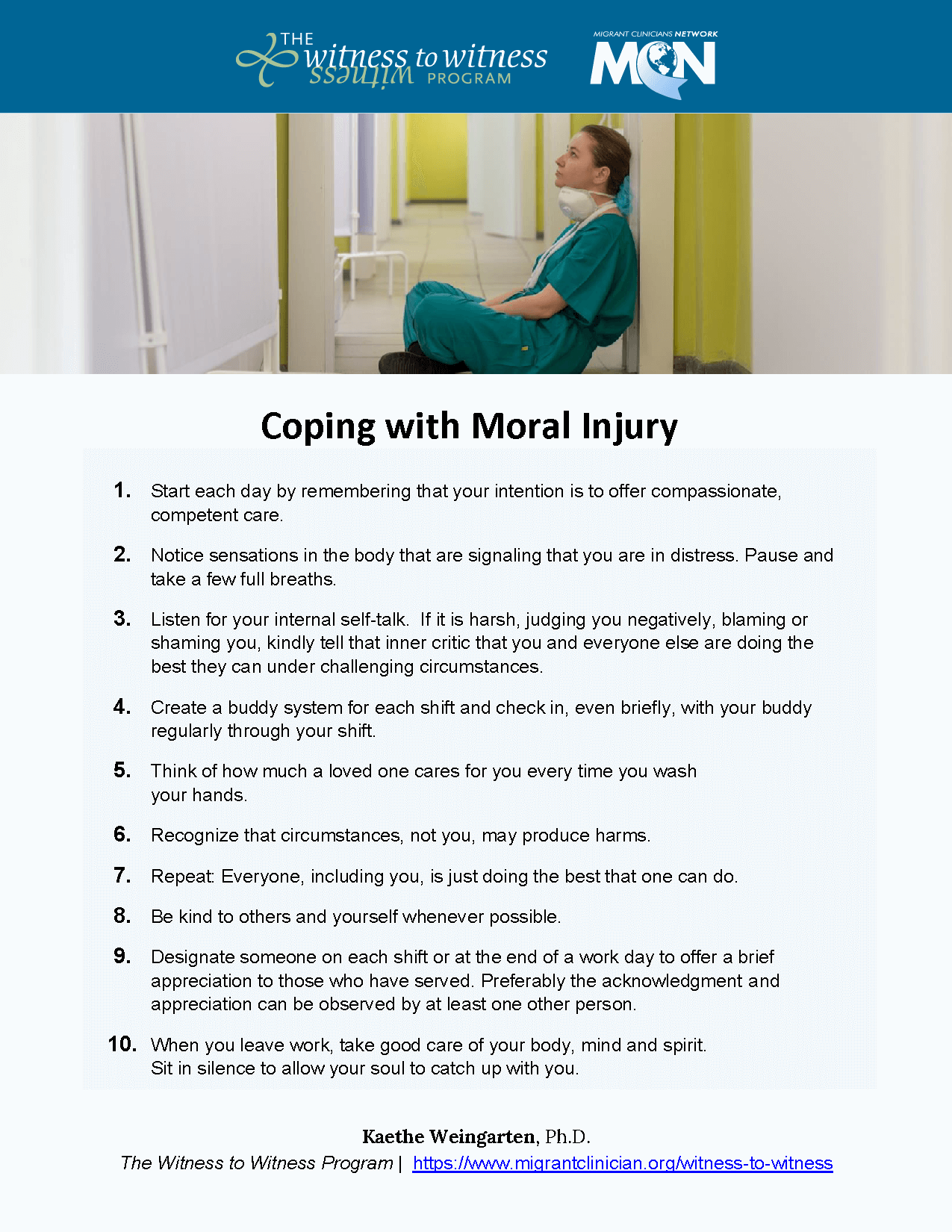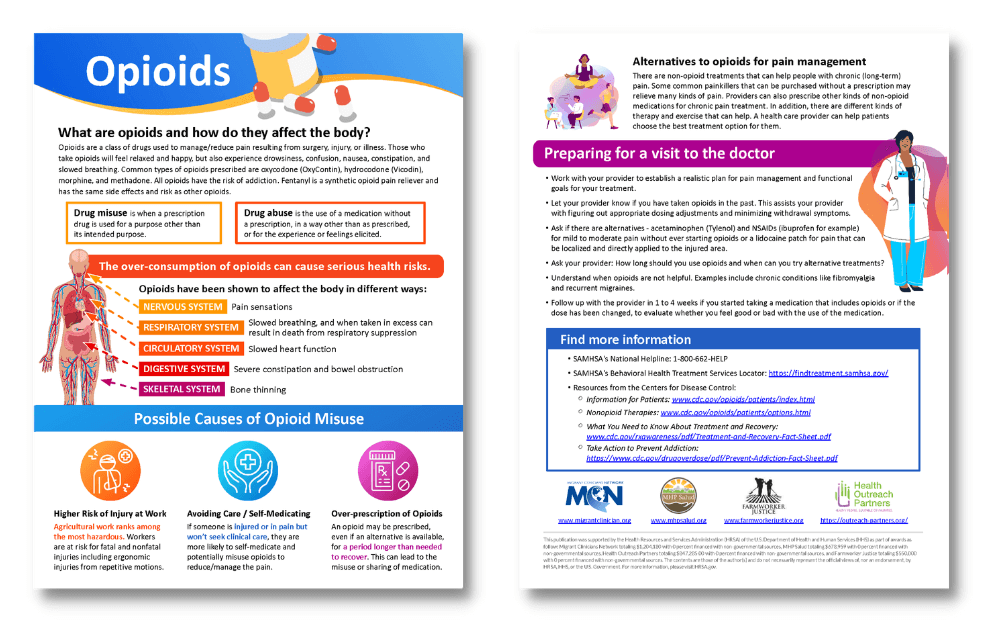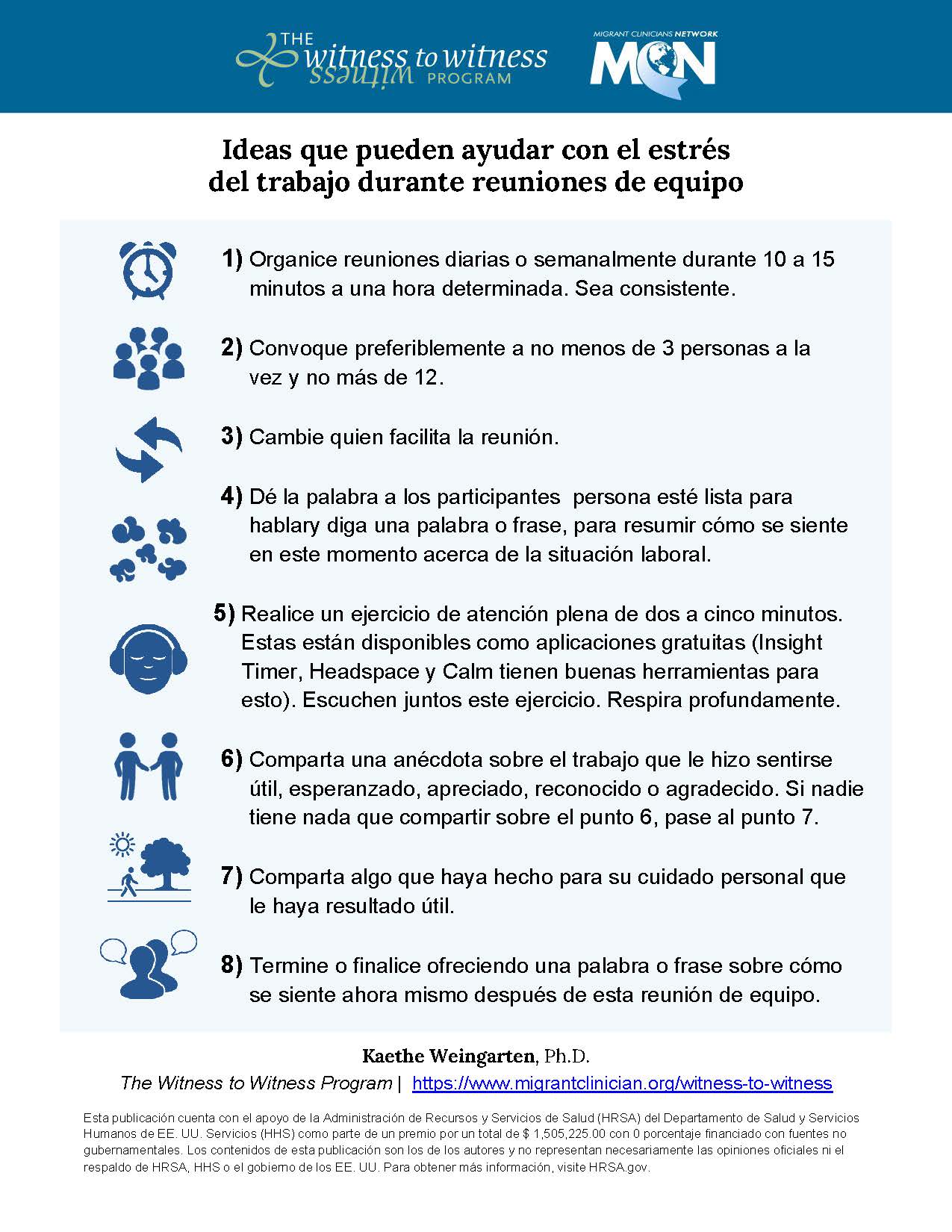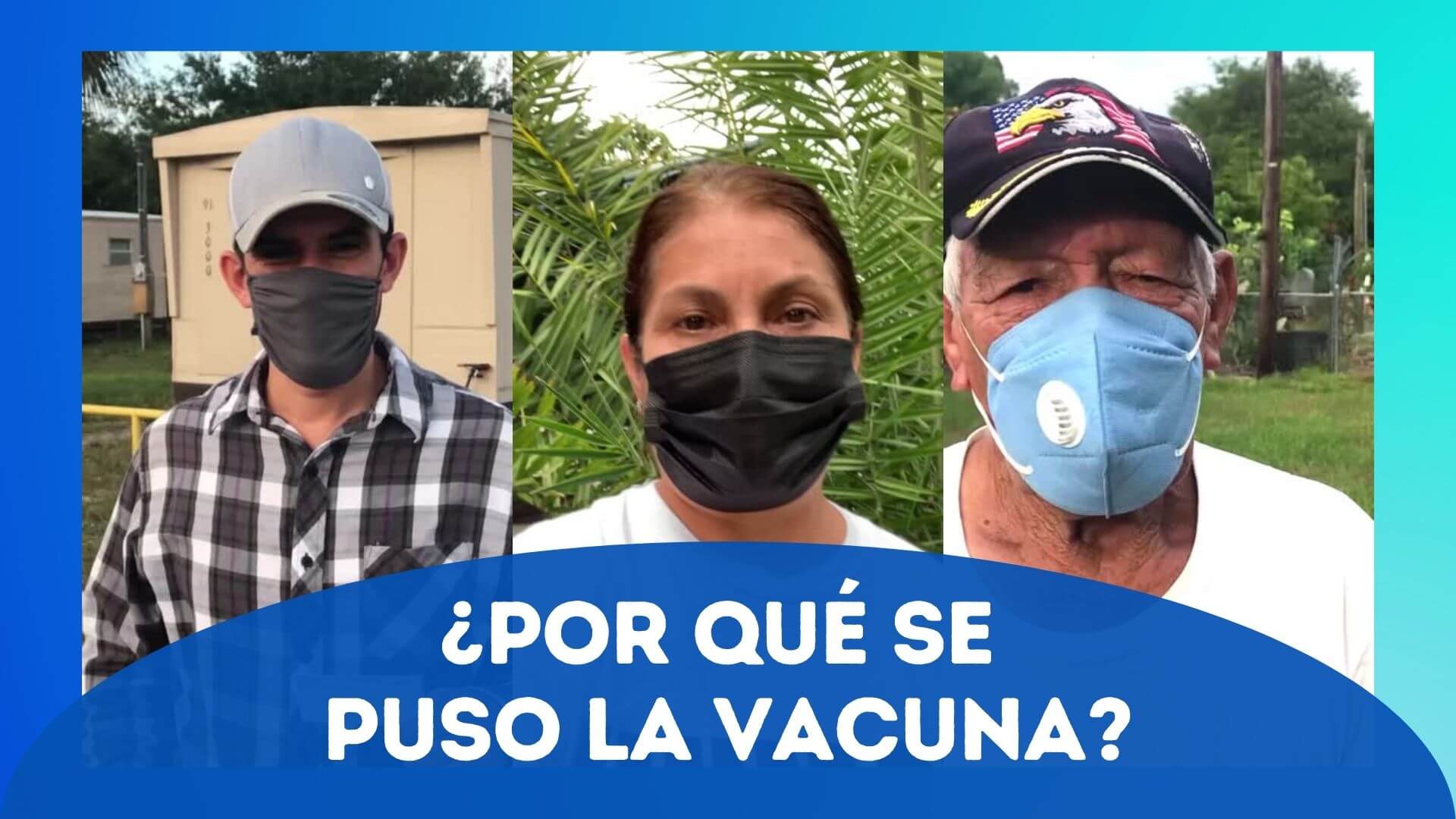copy deeplink Heat-related Illness and Farmworkers - Training Curriculum and Facilitator Guide
Heat-related Illness and Farmworkers - Training Curriculum and Facilitator Guide
Files
- 2022-6-13_Enfermedades-causadas-por-el-calor_Presentacion.pptx (19.18 MB)
- 2022-6-13_HeatStressSpanishFLIPCHART.pdf (7.81 MB)
- 2022-7-21_Heat-Stress-Facilitator-GuideSpanish.pdf (2.43 MB)
- 2022-6-13_Heat-related-illness_Presentation - English.pptx (21.41 MB)
- 2022-7-21_Heat-Stress-Facilitator-GuideEnglish.pdf (2.5 MB)
copy deeplink Failures of US Health Care System for Pregnant Asylum Seekers | White Paper
Failures of US Health Care System for Pregnant Asylum Seekers | White Paper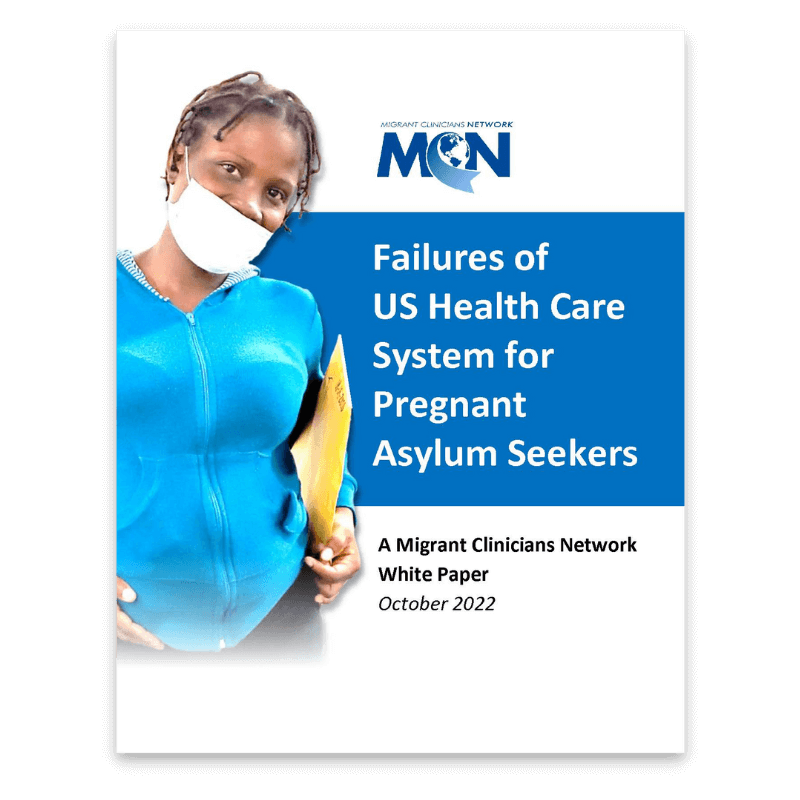
Migrant Clinicians Network's white paper, “Failures of US Health Care System for Pregnant Asylum Seekers,” outlines how pregnant asylum seekers who have been released into the US to await their asylum hearing face extreme obstacles to secure prenatal care, despite their legal presence within the country.
Without prenatal care, infants will not have the benefit of early screening and treatment for potentially life-threatening diseases and screening for congenital abnormalities, while in utero. Additionally, pregnancies without prenatal care may result in excess utilization of emergency services which produces unforeseen strain on the health care system.
Knowledge of prenatal care needs, cost, lack of insurance, transportation, refusal by health centers, and fear are delineated as key barriers for pregnant asylum seekers from accessing the care they need during their pregnancy.
Press contact: Claire Hutkins Seda, cseda@migrantclinician.org.
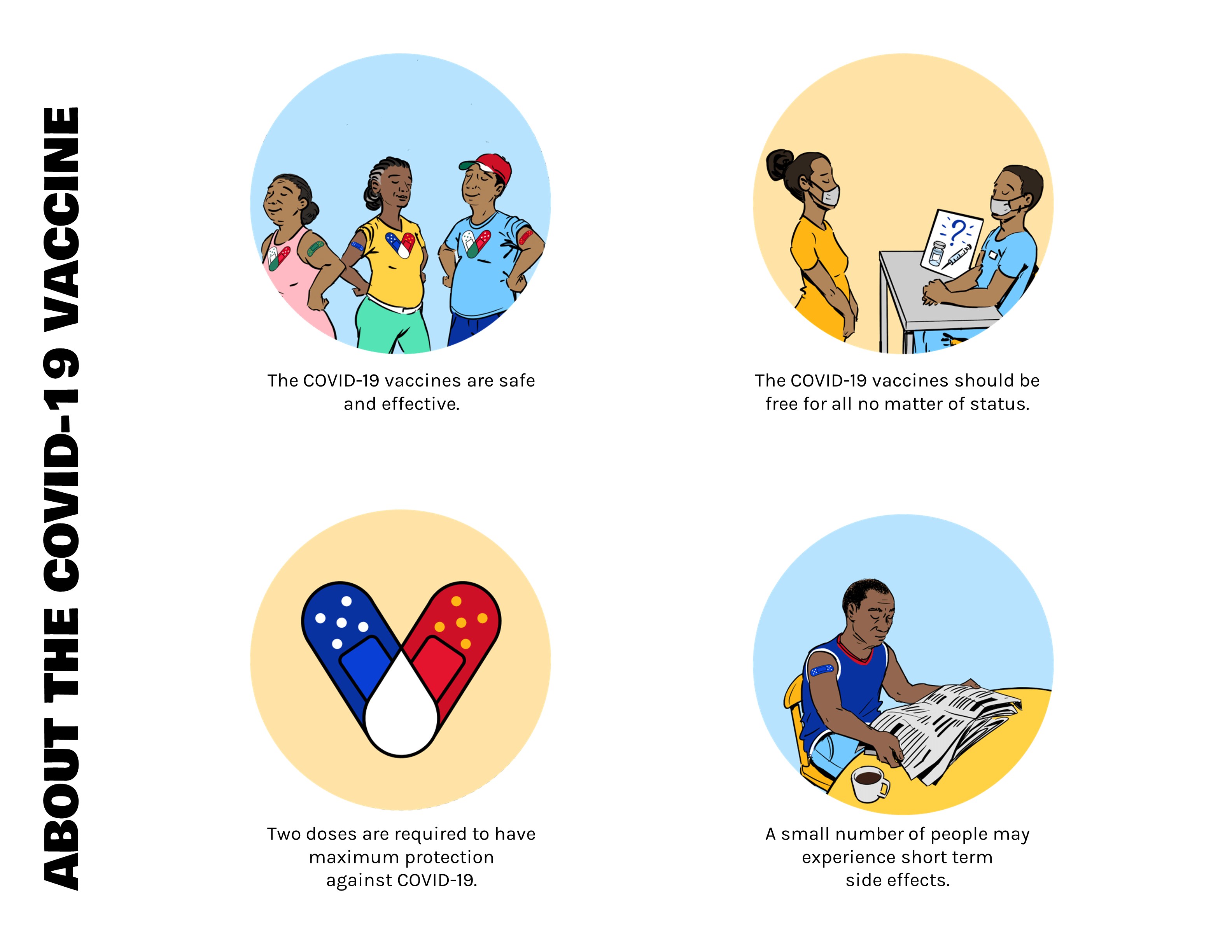
Files
- Fact_Sheet_1_ About_the_COVID-19_Vaccine_Spanish_07122021 (1).pdf (286.42 KB)
- Fact_Sheet_2_ About_the_COVID-19_Vaccine_Spanish_07122021 (1).pdf (306.69 KB)
- Fact_Sheet_1_About_the_COVID19_Vaccine_Haitian_Creole.pdf (341.66 KB)
- Fact_Sheet_2_About_the_COVID19_Vaccine_Haitian_Creole.pdf (320.85 KB)
- ENG_Fact_Sheet_Template.pptx (1.36 MB)
- SPA_Formato_de_hoja_informativa_07_23_2021 (1).pptx (1.58 MB)
copy deeplink Safety and Health on the Farm: It's Your Right and It's the Law - Comic
Safety and Health on the Farm: It's Your Right and It's the Law - ComicThis colorful bilingual comic addresses workers' compensation and immigrant dairy farm workers’ rights and responsibilities. It tells the story of a Mexican dairy farm worker who is injured on the job and the steps he and his employer take to make sure he receives his benefits, and the farm improves its safety.
Files
- DairyWrkrRightsWrkComp_ENG2016_web.pdf (7.78 MB)
- DairyWrkrRightsWrkComp_ESP2016_web.pdf (7.92 MB)
- COMIC - Safety and Health on the Farm - New Mexico - English.pdf (3.4 MB)
- COMIC - Safety and Health on the Farm - New Mexico - Spanish.pdf (3.41 MB)
- COMIC - Safety and Health on the Farm - New York - English.pdf (3.45 MB)
- COMIC - Safety and Health on the Farm - New York - Spanish.pdf (3.46 MB)
- COMIC - Safety and Health on the Farm -Minnesota -English.pdf (7.78 MB)
- COMIC - Safety and Health on the Farm - Minnesota - Spanish_0.pdf (7.91 MB)
copy deeplink Programas de radio | Jornada de Prevención de Trabajadores de Immokalee y Migrants Clinicians Network
Programas de radio | Jornada de Prevención de Trabajadores de Immokalee y Migrants Clinicians NetworkMigrant Clinicians Network (MCN por su sigla en inglés) busca ampliar el conocimiento y la capacidad de los trabajadores agrícolas para prevenir y abordar la infección por COVID-19, a través de programas de radio y otros métodos de comunicación a distancia para aumentar la difusión y el impacto de la educación proporcionada.
Para llegar directamente con los trabajadores agrícolas, MCN se asociará con la Coalición de Trabajadores de Immolakee y Radio Conciencia (107.7FM) LA TUYA! que transmite desde Immokalee, Florida.
Radio Conciencia tiene una amplia audiencia en el área de Immokalee, pero también está disponible en todo el país a través de su presencia en línea. Juntos MCN y Radio Concienca desarrollaría una serie de 4-6 programas de radio que aborden diferentes aspectos de la pandemia de COVID-19.
Cada programa contaría con expertos de habla hispana junto con organizadores de la comunidad. Se incluiría un breve componente educativo, seguido de un segmento de preguntas y respuestas que permita que los miembros de la comunidad agrícolas hagan preguntas directamente a expertos en el tema. Cada programa se grabaría y estaría disponible en línea en el sitio de internet de MCN para que cualquiera pueda descargarlo y utilizarlo como recurso.
Files
- La-familia-y-prevencion-ante-COVID-19_Programa-Nely-entrevista-Carmen-Valdez_8-16-2020.mp3 (36.15 MB)
- La-salud-mental-y-COVID-19_Vanessa-Ibarmea-Programa_8-20-2020.mp3 (25.84 MB)
- Como-protegerse-de-COVID-19-mientras-trabaja_Marysel-Pagan-Santana_8-27-2020.mp3 (34.82 MB)
- La-vacunacion-y-el-COVID-19_Alma-Galvan_10-08-2020.mp3 (25.89 MB)
copy deeplink Microaggressions and Relational Harms in the Workplace | W2W Resource
Microaggressions and Relational Harms in the Workplace | W2W Resource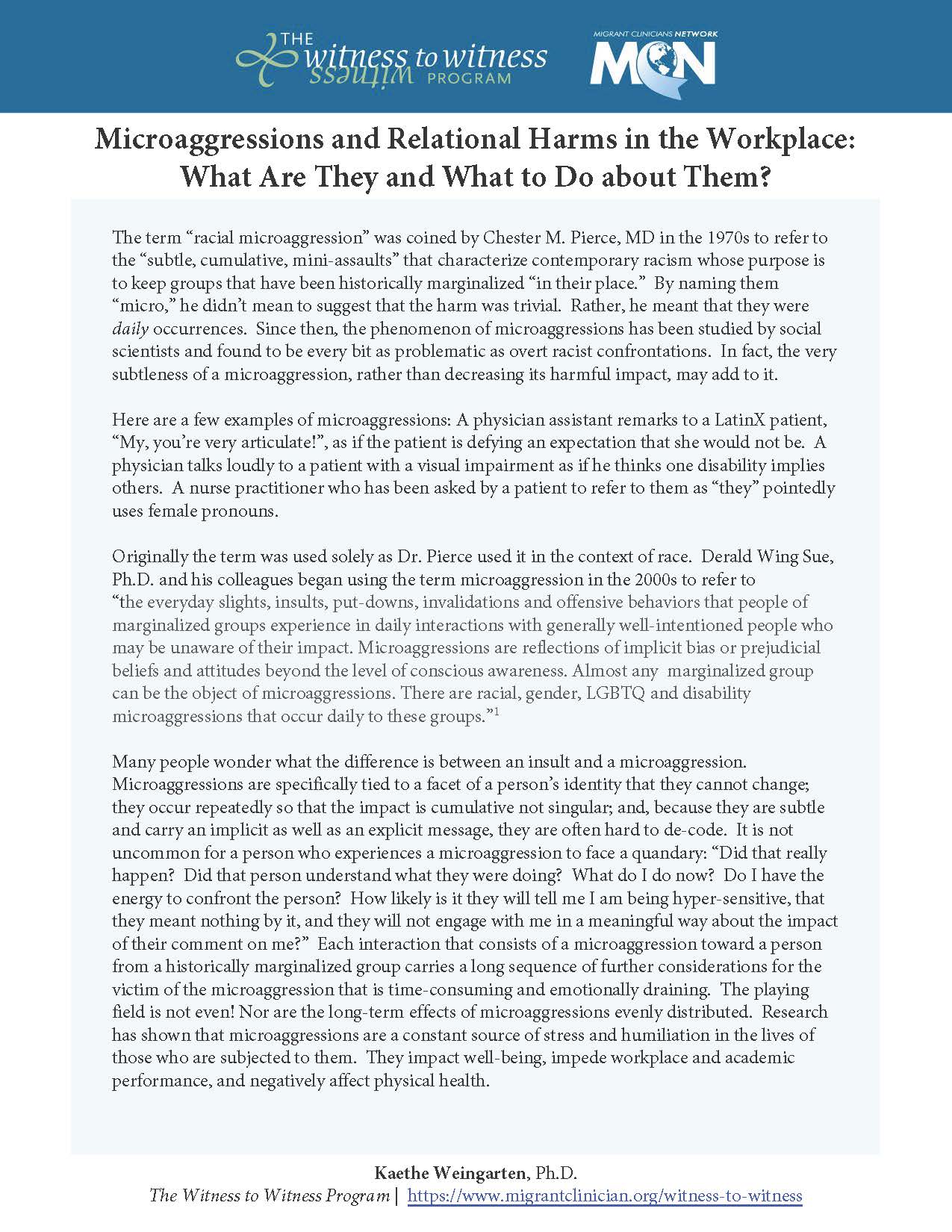
This publication was supported by the Health Resources and Services Administration (HRSA) of the U.S. Department of Health and Human Services (HHS) as part of an award totaling $ 1,310,460 with 0 percentage financed with non-governmental sources. The contents are those of the author(s) and do not necessarily represent the official views of, nor an endorsement, by HRSA, HHS, or the U.S. Government. For more information, please visit HRSA.gov.
Files
- 2022-2-16_Microaggressions-and-relational-harms-in-the-workplace-Part-1.pdf (783.65 KB)
- 2022-2-16_Microaggressions-and-relational-harms-in-the-workplace-Part-2.pdf (217.59 KB)
- 2022-4-14_Microagresiones-y-Danos-Parte-1_Material-de-apoyo.pdf (976.85 KB)
- 2022-4-14_Microagresiones-y-Danos-Parte-2_Material-de-apoyo.pdf (864.7 KB)
copy deeplink ¡Cuídate! A Simple Guide for Preventing Muscle Injuries at Work | COMIC
¡Cuídate! A Simple Guide for Preventing Muscle Injuries at Work | COMIC¡Cuídate! is an educational resource on the prevention of musculoskeletal injuries at work. This comic is in Spanish, English and Haitian Creole.
Files
- injury prevention ENGLISH 2019.pdf (19.34 MB)
- injury prevention SPANISH 2019.pdf (11.9 MB)
- injury prevention WEB CREOLE AUG 14 2019.pdf (12.77 MB)
copy deeplink How to be Empathic Without Experiencing Personal Distress | W2W Resource
How to be Empathic Without Experiencing Personal Distress | W2W Resource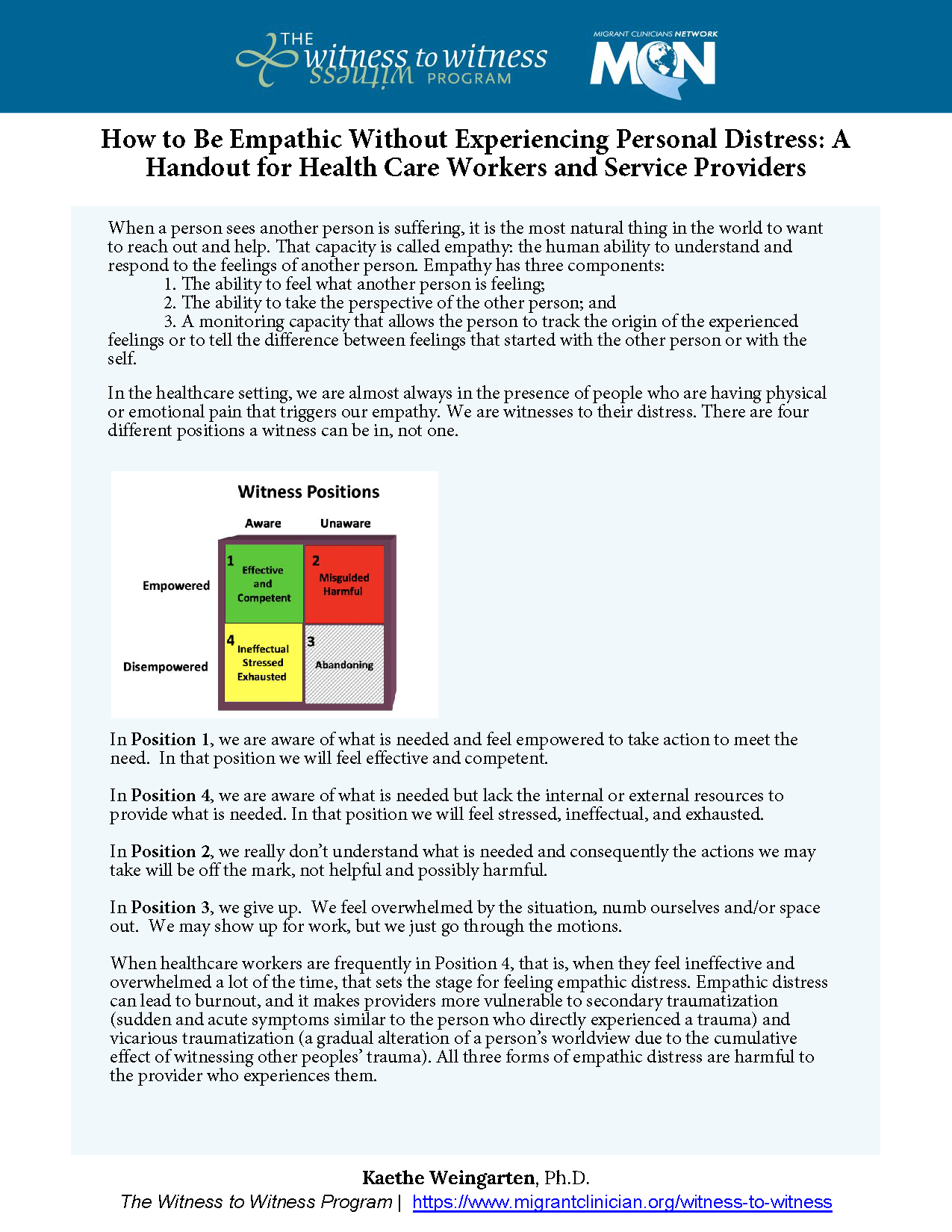
This publication was supported by the Health Resources and Services Administration (HRSA) of the U.S. Department of Health and Human Services (HHS) as part of an award totaling $ 1,310,460 with 0 percentage financed with non-governmental sources. The contents are those of the author(s) and do not necessarily represent the official views of, nor an endorsement, by HRSA, HHS, or the U.S. Government. For more information, please visit HRSA.gov.
copy deeplink NACES (No More Adverse Childhood Experiences) Pilot Project Report
NACES (No More Adverse Childhood Experiences) Pilot Project Report
This pilot project was a collaborative effort involving project partners Futures Without Violence, Alianza Nacional de Campesinas, Líderes Campesinas, RAND, and Migrant Clinicians Network and was made possible with the support of California's ACEs Aware initiative through the UCLA-UCSF ACEs Aware Family Resilience Network (UCAAN) pilot program.
Education, screening, and response with evidence-based interventions are critical to addressing ACEs. However, ACEs education and screening that are culturally aware are not currently reaching farmworker communities in California. NACES aimed to increase opportunities for farmworkers to inform health care screening and responses to ACEs, increase ACEs education in farmworker communities, build partnerships between community health centers and community-based organizations, and ultimately improve access to care.
The project was divided into two parts, a community-based component presented in this report and a clinical component that examines how the results and recommendations of this community-based portion changed health center outreach, education, and response to ACEs. The community-based component was divided into two phases. Phase 1 involved the evaluation of farmworker leader training and Phase 2, the evaluation of the peer-led farmworker training.
The evaluation team employed a participatory action research (PAR) approach, developing instruments, presenting, and validating results with the partners to ensure active participation and collective action from all project partners and the farmworker leaders themselves.
copy deeplink Juan abre los ojos: cómo protegerse de los pesticidas - Comic
Juan abre los ojos: cómo protegerse de los pesticidas - Comic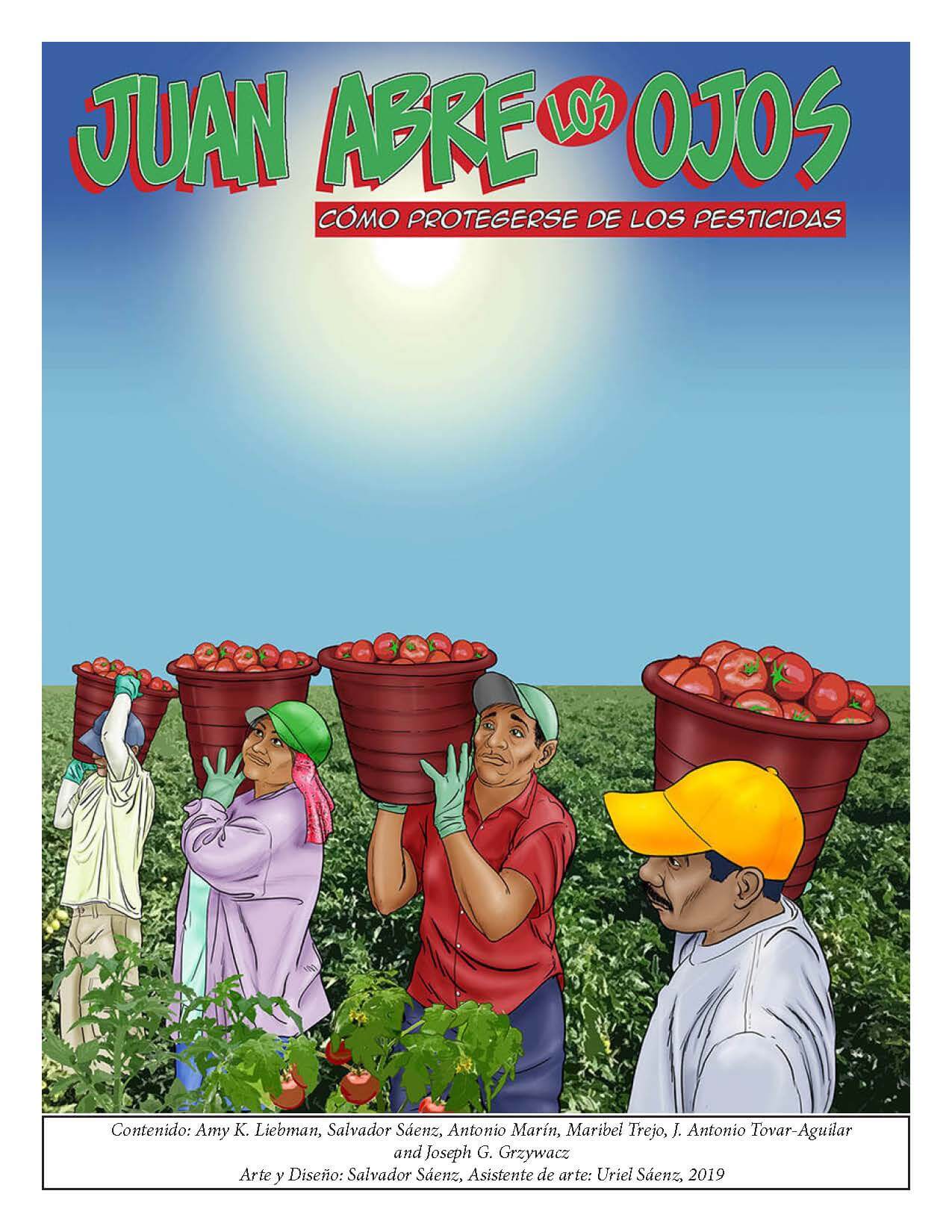
Este libro comic nos cuenta cómo Juan aprendió a protegerse de los pesticidas en el trabajo. Este recurso presenta de una manera muy sencilla y amena cuáles son las fuentes de exposición a los pesticidas, sus efectos en el cuerpo a corto y largo plazo y qué se puede hacer para protegerse de éstos. ¡Es un gran recurso para trabajadores del campo y promotores de salud!
copy deeplink ¡Qué saber sobre la vacuna contra COVID-19!
¡Qué saber sobre la vacuna contra COVID-19!
Este recurso sobre las vacunas centrado en imágenes y en varios idiomas, es editable y le ayudará a llegar a comunidades de refugiados, inmigrantes y migrantes con información importante sobre cómo obtener una vacuna, así como las medidas de seguridad que debe tomar después de ser vacunado. Estos coloridos volantes, en inglés, español y criollo haitiano, ofrecen una opción específica para los estados de Maryland, Virginia y Delaware, pero la versión editable le ofrece la oportunidad de insertar su propia información, específica para su estado, así como su logotipo y símbolos usados en su estado, sitio web de registro de vacunas y número de teléfono. También puede agregar el logotipo de su organización. Junto con estos volantes, MCN ha creado un simple video de "como editar" (ver arriba) para editar el volante. MCN adaptó el volantes del diseño original creado por un miembro del personal del Proyecto Head Start para Migrantes de la Costa Este y quien es hija de un trabajador agrícola, y quien asistió de pequeña al mismo Centro.
Files
- 03102021_What-To-Expect-COVID19-Vaccine-flyer_ENGLISH_Maryland.pdf (249.77 KB)
- 03102021_What-To-Expect-COVID19-Vaccine-flyer_SPANISH_Maryland.pdf (264.86 KB)
- 03102021_What-To-Expect-COVID19-Vaccine-flyer_HAITIANCREOLE_Maryland.pdf (264.51 KB)
- 03102021_What-To-Expect-COVID19-Vaccine-flyer_ENGLISH_Virginia.pdf (252.04 KB)
- 03102021_What-To-Expect-COVID19-Vaccine-flyer_SPANISH_Virginia.pdf (252.18 KB)
- 03102021_What-To-Expect-COVID19-Vaccine-flyer_HAITIANCREOLE_Virginia_0.pdf (252.46 KB)
- 03102021_What-To-Expect-COVID19-Vaccine-flyer_ENGLISH_Delaware.pdf (256 KB)
- 03102021_What-To-Expect-COVID19-Vaccine-flyer_SPANISH_Delaware.pdf (256.33 KB)
- 03102021_What-To-Expect-COVID19-Vaccine-flyer_HAITIANCREOLE_Delaware.pdf (256.24 KB)
- What-To-Expect-COVID19-Vaccine_ENGLISH_flyer.pptx (1.06 MB)
- What-To-Expect-COVID19-Vaccine_SPANISH_flyer.pptx (1.07 MB)
- What-To-Expect-COVID19-Vaccine_HAITIANCREOLE_flyerV2.pptx (1.07 MB)
